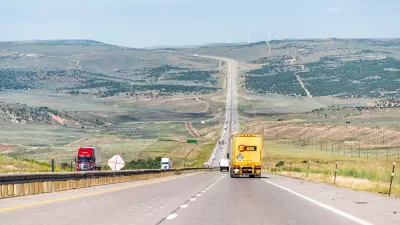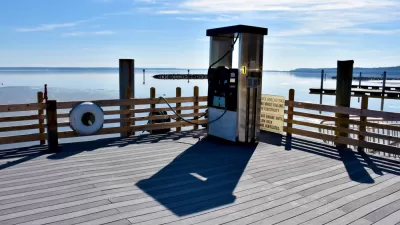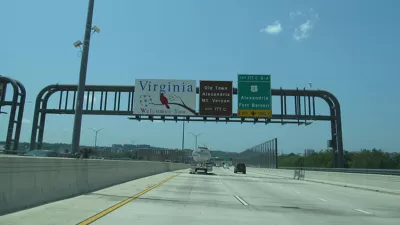Democratic Gov. Ralph Northam announced he is backing Republican legislation to toll all lanes of Interstate 81 to fund $2.2 billion in improvements along the 325-mile corridor, heavily used by trucks, from West Virginia to Tennessee.
"The plan, to be introduced in the Virginia General Assembly session that starts Wednesday [Jan. 9], would establish tolls as a source of revenue for 'critical improvements' identified in a state study [pdf] of the route that...suffers from major safety and reliability problems," reports Luz Lazo for The Washington Post.
With the proposal, Northam and lawmakers representing the western part of the state are choosing to push a toll system over establishing a regional gas tax [and sales and use tax] to pay for the I-81 improvements and in doing so declaring broader support for expanding the state’s toll network.
"It’s time we take decisive action to enhance the safety and improve the reliability of this key corridor,” Northam said in announcing the proposal, which he said would be introduced by state Sens. Mark D. Obenshain (R-Harrisonburg) and Charles W. Carrico Sr. (R-Grayson) and Dels. R. Steven Landes (R-Augusta) and Terry L. Austin (R-Botetourt).
Variable tolls, but not congestion nor dynamically priced
"Electronic toll gantries are expected to be set every 40 to 60 miles or so along I-81, with regular rates set at up to 11 cents a mile for cars and 17 cents a mile for trucks," reports Max Smith for WTOP News.
That would equate to about $55 for trucks to travel the length of I-81 during daylight hours. Tolls would be discounted overnight to encourage truck drivers and others to travel at less-busy times, but the tolls would be a fixed price, unlike the variable cost of lanes on interstates 66, 95 and 495.
Frequent travelers who are Virginia residents could significantly reduce their I-81 toll charges by opting to purchase an unlimited use pass, potentially $30 per year.
Smith adds that high occupancy toll (HOT) lanes and truck-only toll lanes, as Rhode Island is doing, were considered as well. Truck traffic is expected to outpace growth of passenger vehicle traffic on the corridor.
What about authorization from Federal Highway Administration?
Last month, Oregon transportation officials submitted an application to the Federal Highway Authority (FHWA) under the Value Pricing Pilot Program to toll all lanes on stretches of two Portland interstate highways. This correspondent was unable to determine if the I-81 Corridor Improvement Plan requires the Virginia Department of Transportation to apply for an exception to the Title 23 of the United States Code (Highways) general prohibition on the imposition of tolls on Federal-aid highways.
According to FHWA's Center for Innovative Finance Support, the Interstate System Reconstruction and Rehabilitation Pilot Program "allows up to three existing Interstate facilities (highway, bridge, or tunnel) to be tolled to fund needed reconstruction or rehabilitation on Interstate corridors that could not otherwise be adequately maintained or functionally improved without the collection of tolls."
Other revenue options not ruled out
“Everything is on the table right now," Gov. Northam told Jeff Sturgeon of The Roanoke Times on Tuesday. "I would say the consensus is to go more with tolls than taxes,” the governor said.
-
Big Changes Proposed for I-81 in Virginia, October 28, 2018
-
Advocates and Opponents Struggle Over Interstate Tolling, April 7, 2014
Hat tip to IBTTA Smart Brief.
FULL STORY: Next on Virginia’s toll network: Interstate 81

Study: Maui’s Plan to Convert Vacation Rentals to Long-Term Housing Could Cause Nearly $1 Billion Economic Loss
The plan would reduce visitor accommodation by 25,% resulting in 1,900 jobs lost.

North Texas Transit Leaders Tout Benefits of TOD for Growing Region
At a summit focused on transit-oriented development, policymakers discussed how North Texas’ expanded light rail system can serve as a tool for economic growth.

Using Old Oil and Gas Wells for Green Energy Storage
Penn State researchers have found that repurposing abandoned oil and gas wells for geothermal-assisted compressed-air energy storage can boost efficiency, reduce environmental risks, and support clean energy and job transitions.

From Blight to Benefit: Early Results From California’s Equitable Cleanup Program
The Equitable Community Revitalization Grant (ECRG) program is reshaping brownfield redevelopment by prioritizing projects in low-income and environmental justice communities, emphasizing equity, transparency, and community benefits.

Planting Relief: Tackling Las Vegas Heat One Tree at a Time
Nevada Plants, a Las Vegas-based nonprofit, is combating the city’s extreme urban heat by giving away trees to residents in underserved neighborhoods, promoting shade, sustainability, and community health.

How Madison’s Tree Planting Efforts Are Growing a Healthier Community
Madison’s annual tree planting initiative is enhancing environmental resilience, public health, and community livability by adding 1,400 carefully selected trees citywide, with strong community and institutional support for urban forestry.
Urban Design for Planners 1: Software Tools
This six-course series explores essential urban design concepts using open source software and equips planners with the tools they need to participate fully in the urban design process.
Planning for Universal Design
Learn the tools for implementing Universal Design in planning regulations.
Ascent Environmental
Borough of Carlisle
Institute for Housing and Urban Development Studies (IHS)
City of Grandview
Harvard GSD Executive Education
Toledo-Lucas County Plan Commissions
Salt Lake City
NYU Wagner Graduate School of Public Service





























